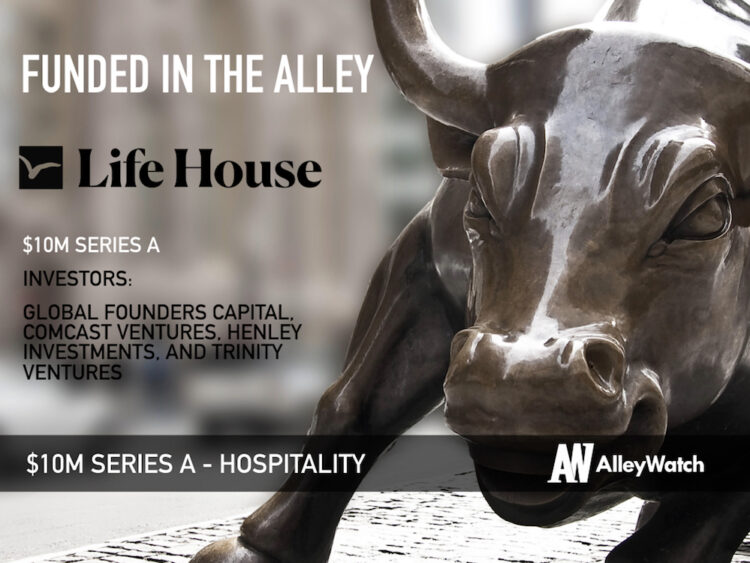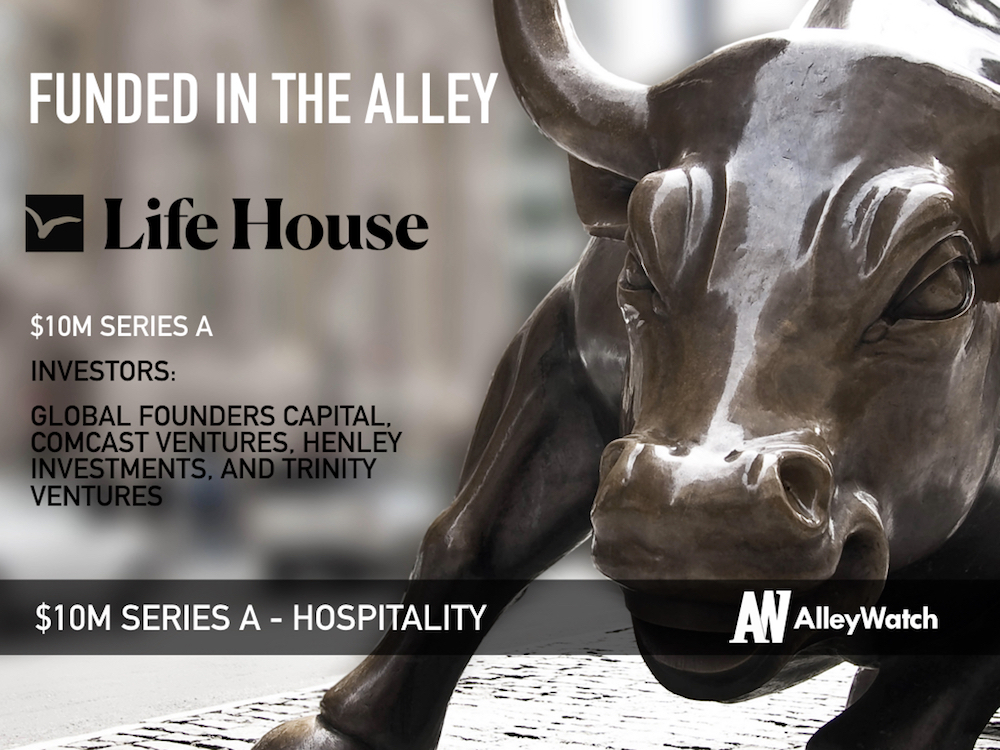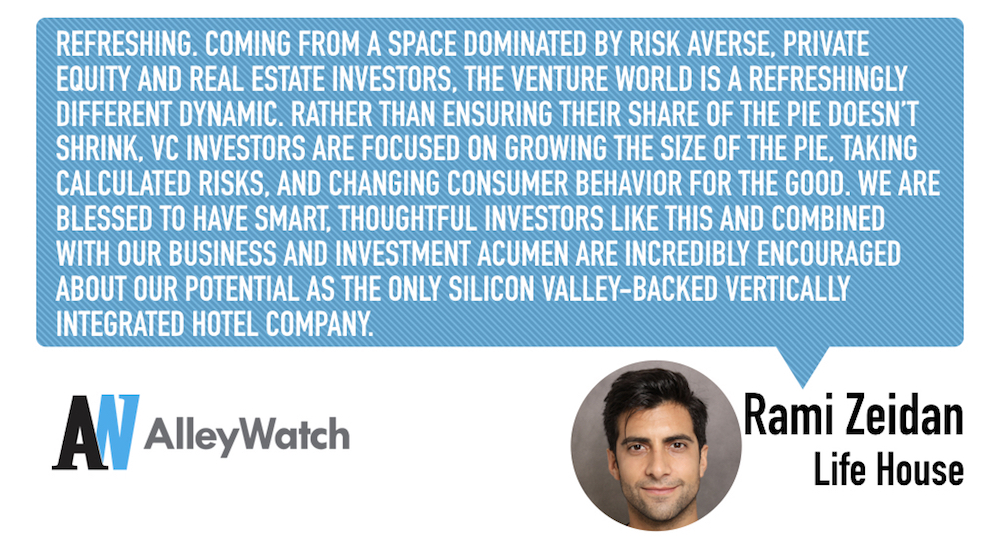After hours of sitting on a plane, there is no better feeling than arriving at your hotel, which is why having a great experience from check-in to check-out is so important. Life House is a vertically integrated lifestyle hotel brand that understands the importance of giving guests the ultimate experience. It creates a unique, community-centered environment by using cutting edge technology and offers a built-in social network that enables fellow travelers to meet each other throughout their trip. It also thoughtfully plans locally-rooted, authentic experiences to foster guest connections with each other and the local community.
AlleyWatch spoke with CEO and cofounder Rami Zeidan on the importance of building community-centric hotels and its latest round of funding for the startup founded in 2017.
Who were your investors and how much did you raise?
Rocket Internet’s Global Founders Capital led the Series A round in February of this year, and Comcast Ventures led the Seed Round in September, while Trinity Ventures has also made a significant investment in both rounds. My cofounder Yury Yakubchyk and I are Johns Hopkins alumns, we invited A-Level Capital (Johns Hopkins’ Student-Led Investment Fund) to participate in the Seed round as well. Henley Investments led the real estate investments and also participated in the venture rounds.
The funding consists of $10M in venture capital to fuel our operations and technology platform, and the $30M in real estate capital is being used for the acquisition and development of its first few properties in the U.S.
Tell us about Life House’s service.
Life House is a vertically integrated lifestyle hotel platform. We not only operate hotels, we develop and design them for real estate owners who want to own high yielding hotel assets but are underserved by institutional developers and operators. For travelers, we will have everything from mobile check-in, keyless entry to a built in social network to meet fellow travelers prior to arrival and during your trip. Our technology platform is powered by a best-in-class proprietary booking experience that makes traveling alone or in a group much more seamless. Finally, we have a customer acquisitions platform that is focused on communicating our brand and product directly to customers seeking this experience to channel direct bookings.
 What inspired you to start Life House?
What inspired you to start Life House?
I’m passionate about solving problems where the solutions can have a positive impact on the people’s wellbeing and the universe. The problems that we’re solving are related to many components, from real estate owners without hotel expertise to hotels without technology expertise to an underserved population of people that consider travel an important part of their life but are underserved by the dearth of accessible accommodations that resonate with their lifestyle & budget. Hotels have not kept up with the demands of their customers, their real estate owners, or technology and the unfortunate truth is that they’re too far along a rigid path to pivot. The problems are complex and interconnected and require a sophisticated solution and an experienced & well-rounded team. In 2017 we set out to solve these problems and we’re excited to have investors that support this vision and appreciate its complexity, our expertise, and the barriers to entry.
How is Life House different?
Just like today’s direct-to-consumer lifestyle brands, nearly all hotel revenue is generated through online channels, but traditional hotels still structure and operate themselves like brick and mortar management businesses. We are applying the best practices from the direct to consumer e-commerce space to lifestyle branded hotels with technology that enhances the travel experience from bookings all the way through checkout. On top of this, we’re creating truly locally-rooted experiences at each property, offering a boutique hotel level of experience at an accessible price point.
What market you are targeting and how big is it?
We’ve started with the low-hanging fruit of repurposing un-branded independent hotels and are already evolving to the entire commodity branded market. The hotel market is a $500 billion industry today and is growing rapidly, and that excludes the home sharing industry where we’re grabbing a lot of market share.
What’s your business model?
Our business model is simple: we get paid for the problems that we solve and not for anything else. As we’re solving problems in the hotel acquisitions (finding hotel deals for real estate owners), construction, design and branding/concepting, hotel management, and customer acquisitions (selling rooms) we get paid fees for these services, preserving the upside potential in the real estate for the real estate investors, and keeping our VC-backed operating company asset-light.
Why is building community-centric boutique hotels needed?
As humans, we are inherently social creatures, especially when we travel. Experiential travel revolves around the people we meet and the experiences we share with them. However, today travel is an independent activity. The barriers to meeting other people at hotels, boutique, budget or luxury, are high. Technology exists in other industries exclusively focused on doing this, but the pain points are related to finding physical spaces to congregate or managing times etc. Hotels provide a unique opportunity where travelers are serendipitously all in one place for largely the same reason, making it easy to connect, but yet there is no tool to encourage & foster this connection. We are intimately focused on creating this tool and fostering this through our locally rooted F&B, that attracts locals & hotel guests alike.
What was the funding process like?
Refreshing. Coming from a space dominated by risk-averse, private equity and real estate investors, the venture world is a refreshingly different dynamic. Rather than ensuring their share of the pie doesn’t shrink, VC investors are focused on growing the size of the pie, taking calculated risks, and changing consumer behavior for the good. We are blessed to have smart, thoughtful investors like this and combined with our business and investment acumen are incredibly encouraged about our potential as the only Silicon Valley-backed vertically integrated hotel company.
What are the biggest challenges that you faced while raising capital?
Our business is new to Silicon Valley and requires a deep dive into the space. Early stage investors naturally are very busy screening investment opportunities so we had to find investors that were willing to dive deep and think outside of their typical box. That said, we found many of those investors and have been well oversubscribed in all of our rounds and are very happy to continue working with our existing investor base.
What factors about your business led your investors to write the check?
Serendipitously I was the TA for a course at Johns Hopkins named Managerial Economics and Business Strategies and Yury was a student in that class. That course was an intense dive into understanding the business and economic forces that allow businesses to succeed based largely on Michael Porter’s Five Forces. We have built a business intimately focused on those forces and feel comfortable articulating these things, as we’ve done in this response, as the barriers to entry (to do what we are doing) are very high.
What are the milestones you plan to achieve in the next six months?
We’re focused on opening our first few branded hotels this fall and growing into new markets. As our company’s success is ultimately a function of our team we are also intimately focused on hiring the right team members and have been very fortunate to have done this to date.
What advice can you offer companies in New York that do not have a fresh injection of capital in the bank?
There is not really any specific advice I can give as I believe everything has its own nuances. The general perspective I can share is based on my belief in fundamentals. Gruelingly define and refine your value propositions and your articulation of a story that uses those propositions in the context of a larger vision. Dream. But make sure those dreams come from a place of good intention. Make sure you’re passionate about the work so that capital and dilution headwinds and sometimes irrational rejections are not going to discourage you.
What’s your favorite restaurant in the city?
I’m not sure I have a favorite per se. I think dining out is a social experience and I appreciate a restaurant that encourages a social experience more than I care for the specific food or drinks. I love Aria Wine Bar in West Village, as it’s a quaint space with a casual communal dining experience and an accessible menu and price point that’s reminiscent of a dinner party at a friend’s house. Our restaurants will have their own personalities not too dissimilar from this spirit, but with world class food and drinks.





